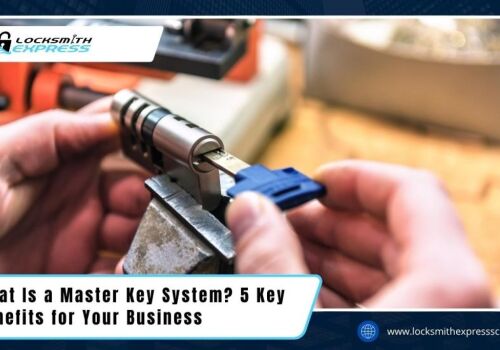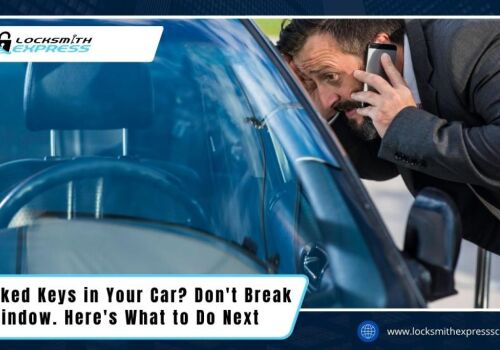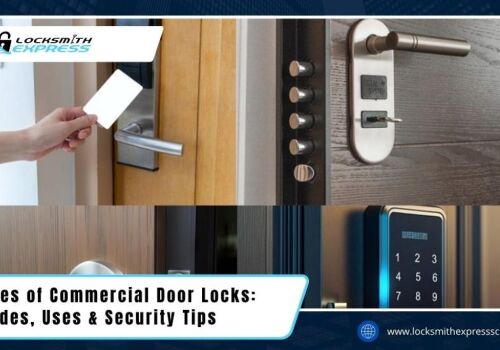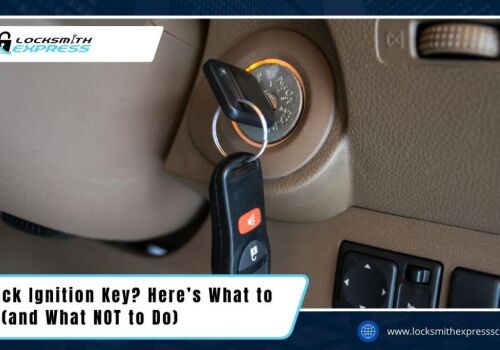Transponder key programming is the process of syncing your key's microchip to your car's computer, a mandatory anti-theft step. If a new key cranks the engine but won't start it, the issue is electronic, not mechanical.
This guide explains the technology, the risks of DIY, and why a professional automotive locksmith is your best choice for a fast, safe solution to get you back on the road.
- What is a Transponder Key?
- How does the "digital handshake" secure your vehicle?
- Why This Car Key Programming Service is Essential
- What is the anti-theft feature that hotwiring can't beat?
- What happens when a key isn't programmed?
- What are common scenarios that require key programming?
- Can You Program a Transponder Key Yourself?
- Why do you need a pro with specialized equipment?
- What are the serious risks of DIY attempts?
- Professional Programming: Locksmith vs. Dealership
- How do your options compare?
- Trust the Professionals
- Frequently Asked Questions
- How do I know if my car key needs to be programmed?
- How long does the programming process take?
- Can you program a used key I bought online?
- What if I've lost all my keys?
- Is this different from programming a smart key?
What is a Transponder Key?
A transponder key, also known as a "chip key," is a standard car key with a tiny Radio Frequency Identification (RFID) microchip built into the plastic head.
This chip doesn't have a battery; it's a passive device that activates only when it receives a signal from the car.
This technology was first introduced to combat high theft rates and has since become a standard for nearly all auto manufacturers. The term "transponder" is a mix of "transmitter" and "responder," which perfectly describes its job of receiving a signal and sending one back.

How does the "digital handshake" secure your vehicle?
This process works like a high-speed, coded "digital handshake" to verify the key is valid before allowing the engine to run.
For the engine to start, the password from the key must match the password stored in the car's computer. This digital verification happens in a fraction of a second:
-
Activation: When you turn the key, the car's immobilizer unit sends a radio signal through an antenna ring around the ignition cylinder. This signal creates an energy field that powers the passive chip in your key.
-
Transmission: The newly powered chip broadcasts its unique, coded ID, which is picked up by the antenna ring.
-
Verification: The car's computer compares the key's code to a list of approved codes stored in its memory.
-
Permission: If the codes match, the immobilizer deactivates, and the engine is allowed to start. If they don't match, the car remains immobilized.
It's important to know that the transponder chip is separate from the remote buttons used for locking and unlocking the doors.
If your key fob's battery dies, the remote buttons won't work, but the car will still start because the transponder chip doesn't need a battery.
Understanding this digital handshake is key. It forms an incredible security barrier, but it also explains why programming is an essential step for any new or replacement key.
So, why is this process so critical, and what exactly happens if you try to use a key that hasn't been properly introduced to your car?

Why This Car Key Programming Service is Essential
Transponder car key programming is a mandatory security process that protects your vehicle from theft. It ensures that only keys with a specifically authorized microchip can start the engine.
What is the anti-theft feature that hotwiring can't beat?
The transponder system is the anti-theft feature that adds a required digital authentication step, making old theft methods like hot-wiring impossible.
Even if a thief bypasses the mechanical lock, the car’s computer will not receive the correct approval code from the chip. As a result, the engine will be denied fuel and spark, keeping the vehicle immobilized.
What happens when a key isn't programmed?
You will experience a specific set of symptoms, most notably the engine cranking but refusing to start, or a security light flashing on the dashboard. This is the clearest sign that the car’s immobilizer has not recognized the key.
In some vehicles, the engine may start for a second or two and then immediately shut down. Additionally, if your key has remote buttons for locking and unlocking, those functions will not work until the key has been fully programmed.
What are common scenarios that require key programming?
You need professional programming in several common situations, such as car key duplication for a spare key or replacing one that was lost or broken. A new key must be digitally introduced to the car's computer before it will work.
Programming is also necessary if you've replaced the vehicle's engine computer (ECU) or if the car battery was disconnected for a very long time. For security, it's wise to reprogram keys after buying a used car to erase any old keys from the system's memory.
It’s a similar principle to when we assist homeowners in upgrading their security; recently, a client desired to replace their outdated home door lock with a modern, more secure smart lock solution, giving them better convenience and peace of mind.
Given these specific symptoms and common scenarios, it's clear that programming is essential. This naturally leads to a common question from drivers looking to save time and money: Is it possible to handle this programming yourself?
Can You Program a Transponder Key Yourself?
For the vast majority of modern cars, the answer is no. While some much older vehicles had procedures that allowed owners to program a third key if they already had two working ones, these methods have been phased out for more secure systems.
Why do you need a pro with specialized equipment?
Programming a modern key requires a direct, secure connection to the car's protected computer systems. Professionals use advanced diagnostic tools from brands like Autel or Xhorse that connect to the vehicle's On-Board Diagnostics (OBD-II) port.
These professional programmers can access the immobilizer's software to read security PIN codes, add new keys, and erase lost ones. This level of access is intentionally blocked from consumer-grade tools to maintain the vehicle's security.
What are the serious risks of DIY attempts?
Attempting to program a key yourself can lead to expensive and very serious damage. The biggest risk is "bricking" the car's main computer (ECU), which can happen if an incorrect command is sent or power is interrupted.
A bricked ECU makes the car completely unusable and can be a very costly repair. You can also permanently lock the new key's chip with a failed attempt, making it worthless, or even accidentally erase your only working key from the car's memory.
With the serious risks involved, it's clear that DIY attempts are not worth the gamble. This leaves you with two professional options: the dealership or a qualified automotive locksmith. But how do you choose?
Professional Programming: Locksmith vs. Dealership
You have two primary professional options for this service: a car dealership or a qualified automotive locksmith. While both are capable, a mobile locksmith is often the better choice due to major differences in convenience, speed, and overall logistics.
The fundamental advantage of a mobile locksmith is that we bring the solution to you. If you've lost all your keys, the dealership requires you to have the car towed to them, adding a significant hassle and requirement to the repair.
How do your options compare?
|
Feature |
Car Dealership |
Professional Mobile Locksmith |
|
Convenience |
Requires scheduling an appointment, driving to the service center, and waiting. |
Fully mobile service. We come to your location, home, work, or roadside, saving you the trip. |
|
Towing |
Mandatory if you have no working keys, adding significant cost and hassle. |
Not required. We can create from scratch and program a new key on-site, even if you've lost all of them. |
|
Speed |
It can take hours or require leaving the car overnight. Parts may need to be ordered, causing days of delay. |
Service is typically completed on-site within an hour, getting you back on the road faster. |
|
Expertise |
Highly trained, but their knowledge is often limited to their specific vehicle brands. |
Broad, wide-ranging expertise across a wide range of makes and models, both domestic and foreign. |
|
Availability |
Restricted to standard business hours (Mon-Fri, 9-5). |
Often available 24/7 for emergency call-outs, providing a solution when you need it most. |
Trust the Professionals
In summary, transponder key programming is a critical security feature that protects your vehicle from theft. While the technology is complex, the solution is straightforward.
Attempting a DIY fix can lead to costly damage, making professional service essential. A qualified mobile automotive locksmith offers a faster, more convenient, and often more affordable solution than a dealership, bringing the expertise and equipment directly to you.
When you face a key programming issue, trust Locksmith Express to get you back on the road safely and quickly

Frequently Asked Questions
How do I know if my car key needs to be programmed?
The most common signs are that the engine cranks but won't start, the engine starts then immediately dies, or a security light is flashing on your dashboard when you try to use the key. These symptoms point to a communication failure between the key's transponder chip and the car.
How long does the programming process take?
For the vast majority of vehicles, the entire service is completed in less than an hour. This includes the time it takes for a technician to arrive, cut the key blade, and perform the electronic programming.
Can you program a used key I bought online?
It is highly discouraged because most transponder chips are "locked" to the first car they are programmed to and cannot be reprogrammed to another vehicle. It is always safer and more reliable to use a new, high-quality key that is guaranteed to be compatible.
What if I've lost all my keys?
This "all keys lost" situation is a common emergency that a mobile locksmith is perfectly equipped to handle. We come to your location, create a new key from your car's VIN or door lock, and program it on the spot, saving you the significant cost and hassle of towing.
Is this different from programming a smart key?
Yes, the process is different for a smart key. A smart key allows for keyless entry and push-button start by actively communicating with the car, whereas a transponder key is passive and must be in the ignition. Programming these advanced systems involves different procedures that our technicians are also trained for.






